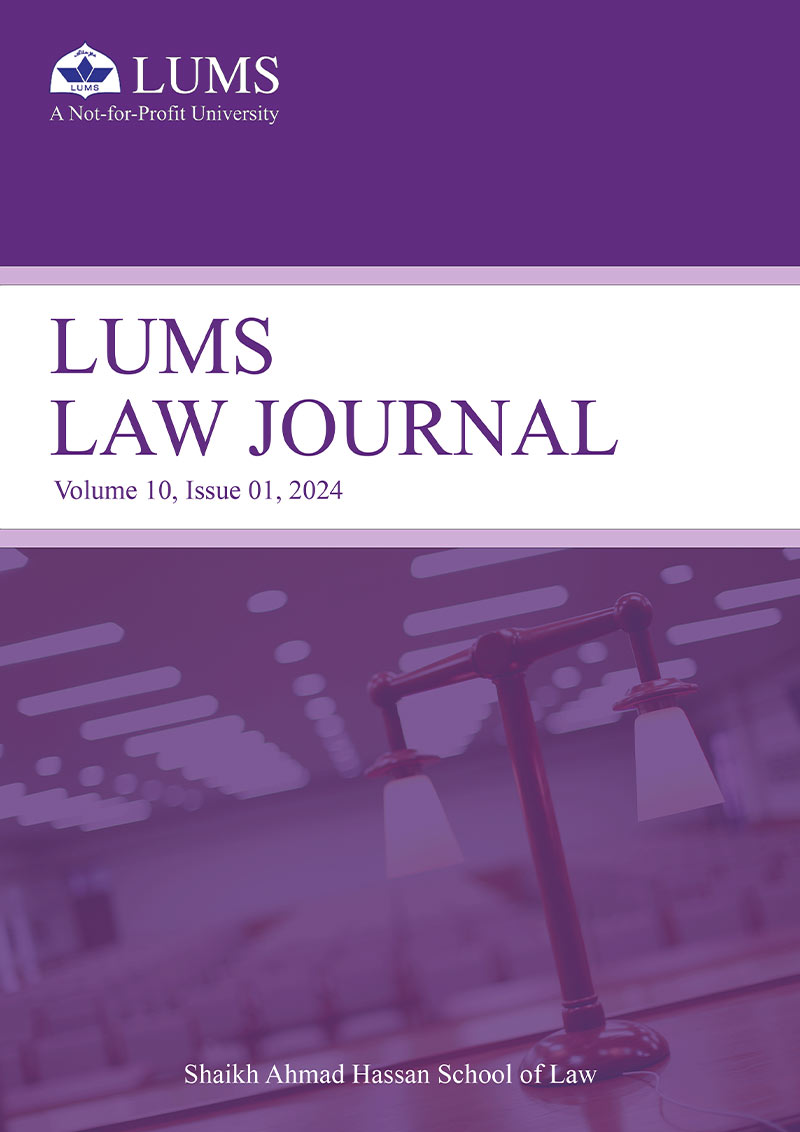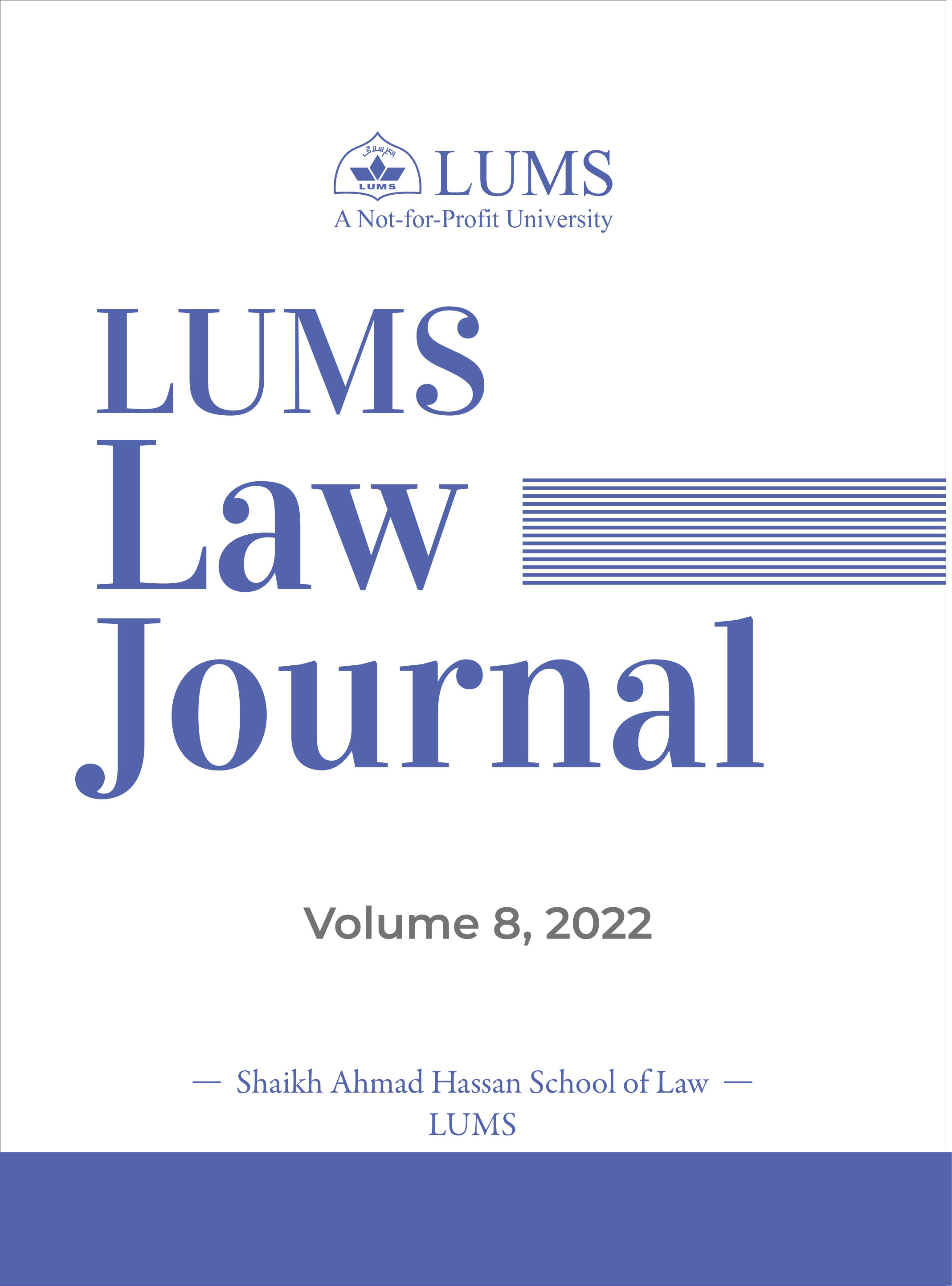Shaikh Ahmad Hassan School of Law
About the Journal
LUMS Law Journal is a peer-reviewed journal of Shaikh Ahmad Hassan School of Law, Lahore University of Management Sciences. The primary aim of the Journal is to provide a forum for scholarly debates amongst law students, faculty, lawyers, judges, practitioners and experts on important legal issues, which may lead to policy reforms. This Journal is an endeavor to foster a profound understanding of contemporary legal issues among its readers. While maintaining all the standards of academic legal scholarship and integrity, this Journal seeks to inform public discourse by publishing articles that are intellectually rigorous and thought provoking. It aims at providing its readers with a detailed, advanced and an insightful legal analysis of various ongoing developments in the legal arena in Pakistan and abroad. It is intended to stimulate interest in all matters pertaining to law, with an emphasis on matters arising from the relationship of law to other disciplines.
For the realization of its goals, the Journal draws on the academic rigor and excellence of various students, faculty members, lawyers, judges and practitioners by featuring their valuable contributions in the Journal. The Journal strives to uphold its vision of publishing challenging and useful legal scholarship of highest academic quality, a vision that is true for all times.
Submissions
Contact Us
Contact Us
For Submissions:
For Queries:
Follow us to know more about our events.
Instagram:
https://www.instagram.com/lumslawjournal?igsh=aGIwYm5yeWt0ZWU3
Facebook:
https://www.facebook.com/LUMSLawJournal?mibextid=hu50Ix
LinkedIn:
https://www.linkedin.com/company/lums-law-journal/
Twitter:
https://x.com/lumslawjournal?s=21
Submissions
Guidelines for print and online posts are mentioned below. Please email your submissions to submissions.llj@lums.edu.pk or contact llj@lums.edu.pk for any queries.
The LUMS Law Journal (LLJ) is pleased to announce a call for papers for its upcoming volume. The LUMS Law Journal is a peer-reviewed annual publication. We have the honour of being indexed on Scopus and HeinOnline. LLJ is known for producing scholarly discourse amongst law students, faculty, lawyers, judges, practitioners, and legal experts.
Authors can make the following kinds of submissions:
- Articles
- Comments
- Case Notes
- Legislative Reviews
- Book Reviews
The guidelines for each submission are as follows:
- All manuscripts should be in MS Word format;
- All text should be double spaced with 1-inch margin on all sides using a Times New Roman font of size 12;
- Any material submitted to the Journal should be original and must not have been published elsewhere;
- Co-authorship/multiple authorship is permitted.
- The length of articles should be between 6000 to 8000 words. The articles should be thoroughly researched and referenced by way of footnotes;
- Comments on recent legislations and bills should be 2000-4000 words long;
- Case notes/Comments on recent judgments should be 2000-4000 words long;
- All word limits are exclusive of footnotes;
- Oxford Standard for Citation of Legal of Legal Authorities (OSCOLA) would be the definitive style guide for legal citation. Access the OSCOLA citation guide here: chrome-extension://efaidnbmnnnibpcajpcglclefindmkaj/https://www.law.ox.ac.uk/sites/default/files/migrated/oscola_4th_edn_ha…;
Submission can be made throughout the year. We look forward for submissions for the upcoming volume. For more please visit our website: https://sahsol.lums.edu.pk/law-journal
Online Publication
The LUMS Law Journal (LLJ) is calling for submissions for blogposts in the form of case commentaries on important judgments. The word limit for these commentaries is 1000 words. We encourage academics, practitioners, and students to participate in this endeavor. The aim of these commentaries is to contextualize the judgment and make the contents accessible. Here are factors to consider while writing a case note/commentary:
- Facts and issues arising out of the judgment, the relevant law at the time the judgment was passed, and if there have been legislative changes since the judgment was passed.
- Arguments and Decision: Arguments of the parties and the decision by the court. Was there a dissent? If so, what argument did the dissent make? What statutes and previous cases did the court rely upon to reach the decision? Along with the facts and issues, this should bring the author to around 500 words.
- The impact of the judgment: for instance, is it setting aside or aligning with preceding judgments; does it pave the way (and if so, then how?) for new forms of interpretation etc. This can also entail subsequent social/legal/political developments. The author may also ask the question of how this case may affect future developments.
- Background: Place the judgment in its social, historical, or political context. The commentator can choose to focus on one particular aspect more than another, if they feel that it more adequately explains the rationale behind the judgment.
The LLJ is a peer-reviewed publication. We are indexed on Scopus and HeinOnline. If you would like to publish with us, please email your submission at submissions.llj@lums.edu.pk, or have any queries, please contact llj@lums.edu.pk. For submissions for blogpost please mention “LLJ Blog” in the subject tab.
General
Code of Conduct: LLJ seeks to publish informed opinion based on analysis of evidence with adherence to the highest editorial standards. We welcome critical and thought-provoking opinions. Any piece submitted to us should not been simultaneously offered to any other publication. LLJ will not publish submissions that do not live up to these standards.
Editorial Changes: The editors reserve the right to request edits and changes to improve the persuasiveness of the piece.
Plagiarism: LLJ does not tolerate plagiarism of any kind. Examples of plagiarism include, but are not limited to: representing the work of another as one’s own; failing to properly credit another author’s work; and reusing language from one’s previous publications without adequate citations.
Citations: Kindly use Oxford University Standard for the Citation of Legal Authorities (OSCOLA) for all citations.
Format and Style: All manuscripts should be in MS Word format. All text should be in double space with 1-inch margin on all sides using a Times New Roman font of size 12.
Inside the current issue
Volume 10
Upon completing 10 years of the LUMS Law Journal, we are elated to share the Volume 10 of the Journal. We have experienced increase in the number of submissions along with greater diversity in the areas of interest touched upon by our contributors, with Volume 10 featuring multiple international contributors as well. This volume entails 7 articles, 2 case commentaries, and a book review. While some articles touch upon local privacy and sedition laws, others look at protection of Indian coastal ecosystem, enforced disappearances in Iraq, criminal liability of child soldiers under international law, and TWAIL. This has allowed the LUMS Law Journal to establish greater relevance in the international legal community as well.
More Articles















